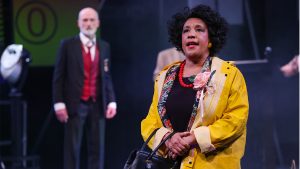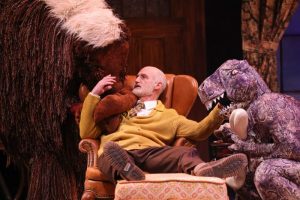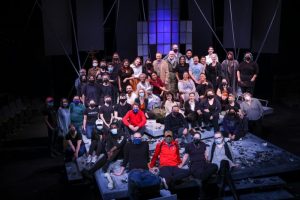Tomorrow PlayMakers Repertory Company will perform Thornton Wilder’s “The Skin of Our Teeth,” its first live, in-person production in almost two years.

Magic is back at PlayMakers Repertory Company. On Nov. 13, Thornton Wilder’s “The Skin of Our Teeth” will open as PlayMakers’ first live, in-person production since the pandemic closed the production of “Julius Caesar” in March of 2020, and the cast and crew are ready for audiences to return to the Paul Green Theatre.
“There is a sense of homecoming, but home doesn’t look exactly the same,” says Vivienne Benesch, the play’s director and the producing artistic director of PlayMakers. “The past 18 months have felt like living through a play with no clear final act, but we’re finally seeing a light at the end of the tunnel.”
That light is PlayMakers’ 2021-22 season, with five productions between November 2021 and May 2022 and live audiences planned for all of the performances.
When the curtain goes up on Nov. 13, what the audience won’t see is the months of preparation, hard work and rehearsals that made live, in-person theater a reality again.
A play worth returning to
Thornton Wilder’s play “The Skin of Our Teeth” is a three-part allegory about mankind that follows the members of a New Jersey family as they survive an ice age, a flood of Biblical proportions and an apocalyptic war. Benesch says the play has resonance after the last 20 months of collective trauma and points to Wilder’s own description of his 1942 play: “It was written on the eve of our entrance into the war and under strong emotion, and I think it mostly comes alive under conditions of crisis.”
Benesch, who was directing “The Skin of Our Teeth” 20 years ago in New York just before the twin towers fell, understands how the play resonates with audiences in the context of whatever crisis is current. Two decades later, the story of a family living through repeated catastrophes but continually rebuilding and moving on is relevant again.
“This play is a cultural roller coaster ride that will surprise you, make you laugh, make you sad and most of all, make you think,” says Benesch, a professor of the practice in the College of Arts & Sciences’ dramatic art department. “At its heart this is also a beautiful family story about marriage, faith, children and generational trauma.”

Kathryn Hunter-Williams, who plays one of the lead roles, Mrs. Antrobus, says that returning to the stage and to this play in particular emphasized how the world changed during the pandemic.
“Acting face-to-face with another person feels both familiar and fresh,” says Hunter-Williams, a faculty member in the dramatic art department. “This is reflected in the play as well, but it feels like we’re starting over in a new world with a different perspective.”
Hunter-Williams noted the reckoning that American theater has undergone during the past couple of years, in confronting racism within the institution and a general lack of diversity in all facets of theater.
“We had to ask ourselves, ‘How can we continue to do what we love, but better?’” says Hunter-Williams. “The pandemic forced us to pause and consider what changes we needed to make to create a healthier environment.”
Keeping the audience safe
PlayMakers adjusted its typical procedures this season to ensure that the audience, cast and crew are safe during shows. That includes requiring all audience members and staff to wear face coverings inside all areas of the theater.
PlayMakers increased its sanitation measures, including adding touch-free electronic ticketing, installing HEPA filtration units and putting acrylic barriers into the box office windows. High traffic areas are being cleaned more frequently, and hand-sanitizing stations are placed throughout the theater.
Since all audience members will be masked, most performances will be sold for full capacity, with two nights reserved for socially distanced performances per production.
Out of an abundance of caution, PlayMakers developed a contingency plan if it has to cancel performances of “The Skin of Our Teeth” due to COVID-19: They will capture a high quality recording for ticket holders to stream, or, if recording is impossible, audience members can receive a refund, use the value of the ticket toward a future performance or donate the value of the ticket back to PlayMakers.
Rebuilding the theater
When audiences step into the Paul Green Theatre on Nov. 13, they’ll see a set built entirely from scratch by the technical team. This production of “The Skin of Our Teeth” requires scenes of sandy beaches, an ice age and a New Jersey boardwalk to be interchangeable onstage, and the technical team had their work cut out for them.
“There are so many moving parts in this set, and elements that look stationary will move when the audience least expects it — if you’re going to the show, keep an eye on the window,” says Laura Pates, the assistant technical director.
To safely create everything needed for the show, the technical team worked eight hours a day in masks while welding, building and sculpting the set and sanitizing their tools often. Pates says that when they first returned, the team needed breaks to step outside for some mask-less fresh air, but wearing a face covering is second nature now.

Undergraduate and graduate students assist the team, but since no in-person technical production classes were taught during the 2020-21 academic year, there are students with only a semester of training working alongside them. They also had to contend with supply-chain issues when materials were either unavailable, triple the normal price or would have taken months to ship.
Despite those hardships, the technical and costume teams collaborated to bring a woolly mammoth back to life for the stage with a fabric and steel puppet that appears in Act 1.
Taking a bow
When the curtain falls on “The Skin of Our Teeth,” it will mark a success not only for PlayMakers, but for theaters across the country. PlayMakers is among a dwindling number of theaters with a resident company, and one of the first to return with such a large, full company production.
The production also features company member and Professor of Acting Ray Dooley’s final performance with PlayMakers as Mr. Antrobus.
“There’s an enormous joy to sharing the stage with Ray for our return and his last role,” says Hunter-Williams. “It adds a tinge of nostalgia to the performance, especially since we’ve worked together for so many years and we’re playing a couple who have been together essentially forever.”

Reflecting on why PlayMakers decided to open its new season with an almost 80-year-old play, Benesch says that the play speaks not only to what’s happened in the past, but how to move forward with empathy.
“Theater at its best helps us to understand what it means to be human beings and how to live in fellowship with each other,” says Benesch. “After the last couple of years we’ve had, I think this play is a great reminder of that.”
By Madeline Pace, The Well
